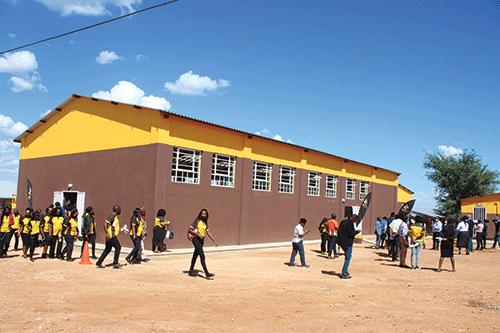While sharing and harvesting ideas for the national budget formulation, finance minister Iipumbu Shiimi says education and health sectors remain priorities, despite repeated undesirable results.
Government has been allocating billions from the domestic budget to the mentioned sectors in contemporary Namibia.
Shiimi made these remarks this week during the mid-term budget review consultations with Civil Society Organisations (CSOs).
“In terms of budget priorities, there is a significant backlog in education and health infrastructure. The education sector needs broad reform. We are now working with that ministry to see how we support this reform agenda – not only with money because sometimes we think money is a problem but if you don’t have the capacity to execute this reform in a cost-effective way, we will not make a dent in our education sector,” said Shiimi.
The minister pointed out that government is already investing a lot in the two sectors, noting they need to find how to deliver these resources.
Despite pumping billions into the two sectors, year-in-year-out, records show that the thorny issue remains that at least 80% of the allocations are gobbled up by remuneration-related expenditure.
The finance minister added government still has to continue investing in the health infrastructure and provision of health services, especially in having required personnel.
During the 2023/24 [financial year (FY)] national budget, tabled earlier this year by Shiimi, the education sector continued to absorb the biggest share of the national purse. About 28.4% was earmarked for the sector.
Looking at the outcome, the grade 11 (Namibia Senior Secondary Certificate Ordinary) and AS levels (formerly grade 12) results show that only 8 133 pupils or 24% qualified for tertiary education from the 38 019 candidates who sat for the 2022 national exams.
Furthermore, basic education got N$16.8 billion in FY 2023/24 and N$51.2 billion over the medium-term expenditure framework (MTEF). The higher education vote was allocated N$3.8 billion, 9.8% higher than the preceding year.
Strengthening safety nets and investing in housing opportunities and water provision are also some of the listed priorities.
Shiimi also gave the health and social services vote an amount of N$9.7 billion in FY2023/24, and N$29.4 billion over the MTEF.
Within that allocation, he said government availed more than N$700 million to the ministry for investments in and renovations of health facilities, the recruitment of medical personnel, as well as the acquisition of pharmaceuticals and ambulances.
However, the National Assembly standing committee on gender equality, social development and family affairs recently highlighted the dire conditions most hospitals and satellite clinics find themselves.
Challenges identified by the parliamentary visit ranged from deteriorating facilities, medication and personnel shortages, lack of ambulances and overcrowded facilities – all of which collectively compromise the quality of service delivery.
Economic growth
At the same occasion, Shiimi said even though the economy has been registering some growth in the past two years, it is not balanced, as it comes from the mining sector.
“The mining sector is not a big employer of the people but it is contributing significantly to the country’s gross domestic product (GDP). We need to work very hard to make sure growth becomes broad-based so we start to feel the impact,” stressed the minister.
The mining industry accounts for about 10% of the gross GDP, 40% of export revenue and 7% of annual government revenue.
Namibia’s economic growth has historically been driven by commodities.
However, this strategy has not been creating the desired number of jobs, as the extractive industry is quite capital-intensive.
Namibia remains at a desperate juncture in its economic development for the introduction of a diversification strategy, as the country cannot rely indefinitely on its natural resources and volatile commodity prices for growth.
The country is today troubled by a high unemployment rate, inequality and poverty rate, despite it registering positive growth in the first decade after independence.
Namibia, with one of the youngest populations in Africa, could reach a staggering 60% youth unemployment rate.
The 2018 National Labour Force Survey results point to an increased need to address youth unemployment, which is estimated to have increased from 43% in 2016 to 46% by 2018.
The most recent figures from the Namibia Statistics Agency (NSA) indicate that the country’s overall unemployment rate dropped slightly from 34% in 2016 to 33.4% in 2018.
Namibia now faces new engines of growth for the economy from the mining sector. They include the green hydrogen ambition and offshore oil discoveries.
BIG dream
Talking on behalf of the CSOs, Institute for Public Policy Research (IPPR) executive director Graham Hopwood said deaths related to malnutrition in the country are not isolated cases but indicative of a brewing widespread catastrophe.
“The key consensus point that has emerged from civil society discussions in recent times is that there is an urgent need for a Basic Income Grant to be filled out. The previous Cabinet decision to convert the food bank into a monthly cash grant is welcome. But the numbers of beneficiaries are negligible in comparison to the scale of the problem,” said Hopwood.
The executive director added that the housing and sanitation in informal settlements are dire.
To arrest this, he called for direct funds for local authorities to subsidise the price of serviced land and plots, and make them accessible, while giving people options to incrementally build on their land.
Hopwood further stressed that there is an urgent need to invest in early childhood development (ECD), noting that results from significant investment in ECD are well documented and could go a long way to improve educational outputs overall.


